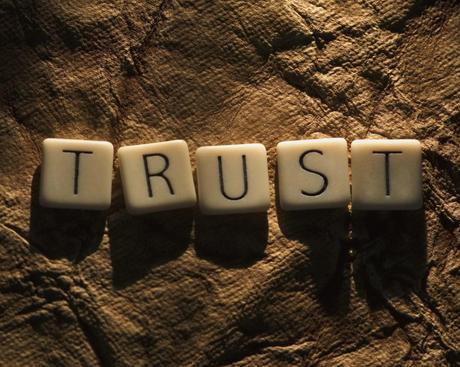
Some say that there are 10 things, that are needed for a good advertising agency / brand owner relationship, some suggest there are 20 things, and I bet someone has made a list of 101 things that are needed for the perfect partnership, which not only produces creative results, but drives sales and profit.
After working with 18 different brands and 28 ad agencies over the past 10+ years I say that the perfect advertising agency / client relationship needs only two ingredients: profit and trust.
And I bet you that these two words, these two concepts, are transferrable to other partnerships independent of the industry.
Of course, it is not that simple in real life. And getting to that point, getting the relationship to work, requires much more on both sides. It not only requires a certain mentality and a group of activities and procedures, but also continuous work. But without those two key components – profit and trust – everything else that is done will be done in vain.
Profit and trust will lay the foundations for all successful advertising agency / brand owner (aka. client) relationships, but in order to give the words the right context, a few key questions need to be answered:
- What is the best practice on how it is managed?
- What is the best practice used by strong clients and agencies to get results – both creative and profitable?
- Why on earth does the quality of the relationship matter?
- Why should you trust this article?
- And what in God’s earth acted as the trigger for this article?
The Trigger: Truth in Advertising.
Bumping into the video ‘Truth in Advertising‘ after a long while, got me thinking about Advertising Agency and Client relationships: Why is the blame often shifted between the parties on quality of work, on process efficiency, on costs and on end results, why the relationship is often in constant turmoil and even inflamed in some form, and why, oh why, does the ‘Truth in Advertising’ really nail some valid points – both of the client and of the agency.
Truth in Advertising.
The Evidence: Extensive Experience in Advertising Agency – Client Relationships With Strong Objective Research At Multiple Sources.
The Rattle About the Experience:
As I mentioned in the beginning, I calculated, that so far in my career I’ve worked with 28 different advertising agencies in 18 different brands (and I might be missing some smaller agencies or separate projects, but that’s not the point). And to not sound pretentious, but I’ve managed to get a good co-operation – a partnership – running with all priority agency teams, and what is very important, creative results that have driven sales. (the agencies and teams I’ve worked with are free to prove me wrong here)
The amazingly observant of you noticed that I said ‘with priority agencies‘. Unfortunately, the ultimate secret method I have used, the best practice of trust and profit according to research, to get the results, together with other key business responsibilities, means I haven’t always been successful in implementing the method fully with all working partners. Still, it has been a choice of priorities, that has had to been made.
But what is more important, and the key topic for this article, is that there’s an easily reproduced way, with which you as a brand owner and manager get the most out of you ad agency. And what is the plus here is, that even the ad agency will benefit from it.
But as is always the case in the world of marketing gurus and internet, you shouldn’t just trust my word on it. You should downright doubt it to the very core of it. But then there is this. The objective research on the best practices, which proves I’ve managed to learn at least something during my career.
The Sources of Research on Ad Agency / Brand Owner / Client Relationships:
This is some of the research on how a partnership between an advertising agency and you the client, or vice versa, you the advertising agency and your client, should be managed.
- Best Practices in Client / Ad Agency Relationships (a pdf for free download for you), Mercer Island Group, 2005.
- Client Agency Relationship White Paper, The Bedford Group, observed on 14.1.2012.
- View on Advertising Agencies and Client Clashes Through Business Relationships, Michael Chernyshev E-MBA, PhD, 25.5.2008.
- Analysis of the Advertising Agency – Client Relationships in Estonia, Copenhagen Business School, Master’s Thesis, Author Name Missing, 2009.
- 10 Ways to Ensure A Successful Agency – Client Relationship, Mike Myers, President, Palio, 1.3.2010.
- Client – Agency Relationship Sustainability: A Look At Industry Trends and Relationship Behaviors, The Bedford Group, May 2002.
- Customer Relationship Management – an Advertising Agency Perspective – Session at Asia Pacific Institute of Management, New Delhi, Kirtian Sharma. 13.12.2010.
- Agency Best Practices, Business Marketing Association, Observed 12.1.2012 (login required) .
- Ten Ways to Get Optimal Performance from Your Advertising Agency, Denneen & Company, Mark Denneen, CEO, June 2009.
- Inside Advertiser and Agency Relationships, American Associate of Advertising Agencies, Don Worthley, 2012. (login required)
- Maximizing Client Agency Relationships, American Associate of Advertising Agencies, Don Worthley, 2010
The research all tells the same story. Sometimes from different perspectives and with different words, but the theme and learning of the story is still the same.
The Importance of Profit in Ad Agency – Client Relationship.
You the brand owner, ask yourself a question: What would you do, if you were in an unprofitable business which still would bring you significant revenue? Try to make it profitable; exit and find a better business; keep the business due to the the cash flow and try to minimise your costs; or try to find the profits elsewhere? Probably all of those and much more, isn’t it so.
Ask yourself, have you ever been part of this?
You the director of the ad agency, ask yourself a question: if a company can get the same result with less price from somewhere else, why would the company want to work for you? If producing an advertising solutions is so expensive, that there will not be left sufficient funds to deliver the message, why would a company work with you? If the cost of doing advertising internally is much cheaper than doing it with you, why would the company and the brand owner want to work with you? Because of the long history and relationship? Is there really any other reasons? And don’t be fooled, there are other agencies that provide the same quality results as you do faster, cheaper and with a wider smile in their face. There always is. And if there isn’t one today, there will certainly be one tomorrow. Yes, this includes also creativity.
The Importance of Truth in Ad Agency Client Relationships.
You cannot put enough emphasis on the word truth. It is the force the when shared by both parties makes the advertising fairies rejoice.
Imagine yourself being told step by step how to do your work. How motivated would you be when your manager, after asking you for an analysis at yesterdays meeting, would today come to your office and show you exactly what figures you should use, what colours the graphs should be, what order the paragraphs should be in and what the analysis should actually say in the end? Not very motivated, I believe.
Trust and respect go to great lengths to nurture a great partnership, it is not just the result of a great partnership.
Trust is critical on both sides. Trust that the ad agency will do their utmost best to find you the solutions for you to get to the goals you need to get to. Trust that they know what they are doing. Trust that the client understands their business and has the reason for their objectives, as well as, the constraints. Trust, that the mid planning changes are not done due to a malevolence, but rather due to new information that has changed the precious assumptions.
But remember: Trust doesn’t mean, that ideas and critique shouldn’t be shared – trust requires that they are shared. And remember that one of the worst foes of trust is lack of information. Lack of information, means lack of communication, which leads to misunderstandings, which does not lead to trust. Provide information, lots of it. On both sides, for both sides.
The Best Practice For Managing Ad Agency – Client Relationships.
The advertising business is a people business. The relationships between an ad agency and a client is a relationship between people. Like any high stress, emotionally charged relationship, partnership and respect between a client and the advertising agency needs constant nurturing. Smart clients and agencies keep communication lines open and clear while working constantly and consistently to keep the relationship on track. Strong partnerships between clients and their agencies will produce the best work and lead to better business results. Longevity, the result of good partnership, is also a key to solid advertising results. Not only due to the higher amount of information, but due to a better relationship and trust that that relationship brings with it.
Best clients manage their agency relationships with consistency through the development of clear roles, processes, and checkpoints. Additionally, expectations are transparent and success is clearly defined. Nonetheless, best agencies strive to always remain proactive and exceed expectations. It is always better to exceed what is expected of you, whether in personal or business relationships.
Key findings from the above research are:
- Strong clients and agencies focus their best practices around working with people – this is a people business.
- Trust is the foundation of lucrative client/agency relationships. Without trust your partnership will not work in the long run. Trust is critical.
- To bring their best to the client/agency relationship, both the client and the agency must be strong partners.
- Sharing information – Without it, opportunities are missed and valuable insights overlooked
- Expertise – Agencies and clients both need to recognize the strengths that each party brings.
- Expectations – Both parties need a mutual understanding.
- Mistakes, Risks and Disagreements – It’s ok to make mistakes and take risks. It is ok to disagree on things. No one is perfect, and without disagreements, not enough perspectives are seen.
- Fun – Have fun with each other. Advertising should be fun. Take time to make it enjoyable, this will build your relationship and trust.
- Treat each other like you want to be treated. If you can’t or won’t, start planning for a new partner.
Key Learnings From Research on Ad Agency – Client Relationship Management.
There is much riding on the relationship between a company and their advertising agency. The best work will come when the relationship is positive and respectful. Therefore, the client/agency relationship, when at its best, is a partnership like a good marriage. Moreover, a successful partnership depends on the strengths of the two parties coming together in a synergistic way.
Key success factors include:
- Open communication and candor
- Freely shared and accessible information
- Transparent expectations and a clear definition for success
Additionally, patience is an integral part of the DNA of a winning client – advertising agency relationship. Both sides must be willing to work hard at the relationship over a sustained period of time. The client and the agency must each be willing to create and sustain the partnership. Ultimately, the payoff for the hard work and patience is longevity in the relationship, enhancing the investment in energy for both parties.
The relationship between client and advertising agency is one of the most unique and important in business. At least in the consumer goods business. It is a complex relationship with each side owning a key to the great financial benefits associated with success. The complexity of the relationship exists as multiple disciplines with different perspectives collide in the pursuit of the same end goals. Specifically, each side of the relationship is seeking to drive the business through marketplace communication. Decisions between the two parties are rooted in fact, but shaped in large part by personal judgment. It is said that marketing is part science and part art, and in no other arena is this as apparent as in the client/agency relationship.
Unlike most business relationships, the client – agency relationship is not transactional or interdepartmental. The client is not like a customer in the traditional sense as there is no exchange of dollars strictly for a measurable product or service. Nor is the agency like other functional units on the client-side such as accounting, finance, manufacturing, or human resources. As the relationship between client and agency is a people-based interaction, not a transactional relationship, emotions are often involved and bruised egos can quickly escalate into full-scale problems. Judging creative is not like making other business decisions. Clients need to recognize the difference between managing creative people versus business issues and between managing designers versus technologists. Because of all the unique challenges, the client – agency relationship is a dynamic relationship. Either good or bad, the relationship is rarely ever so-so.

Trust is the Backbone of Client – Agency Relationships.
Deep trust is at the very core of successful client – ad agency relationships. High levels of trust will ultimately lead to better work and higher efficiency. As with any relationship, trust is created through the meeting of expectations and commitments, either implicit or explicit. Therefore, if trust does not exist, great work is unlikely. Moreover, two companies do not create advertising. It is people and the strength of the relationship they form with one another that create advertising. Most productive relationships are not necessarily always about the work that is created, but rather about the people and how they labor together. The more collaborative and synergistic, the better the relationship, and the better the advertising will be as a result.
All too often, people on the client side underestimate how dependent the creative fields, such as advertising, are on relationship elements. Hence, good clients do not confine their relationship with their agency to presentations in conference rooms. They socialize outside of work to build bonds and nurture an environment where the relationship is positive, even if tough and challenging. Like it or not, agency people will simply work with more enthusiasm and dedication for clients they are fond of, respect and trust. Best clients clearly understand how important their attitudes, actions and decisions are and how these attitudes, actions and decisions affect the performance and morale of their agency partners.
The Importance of Being a Great Partner.
Most clients would say they consider their agency to be a partner, not a vendor. Conversely, most agencies would prefer to not work for a company if they feel the vendor perception exists. However, in reality, the concept of partner can be stronger than the actuality of a partnership that exists in the client – agency relationship. By definition, a partnership is collaborative in nature while a vendor relationship consists of being told what to do and then executing on the demands. Furthermore, a partner has a preferred long-term service provider connotation, which a vendor does not. Since most clients do not have the creative expertise to do the advertising themselves, they have great dependence on their agency. Good clients view their agency as working with them, not for them. It is not a “master/slave” relationship in any way. Sometimes an agency, if truly a partner, will tell a client what they don’t want to hear. However, this type of communication is always done in the best interest of the company.
The client – agency partnership is an extremely interconnected relationship. Both parties have a strong reliance on each other and much is riding on their interaction. To be best partners, the personalities of agency and client must compliment each other, creating a whole that is better than the sum of its parts. Much like a good marriage, good client – agency partnerships are enormously satisfying adventures. Ultimately, the success of the work depends on the strength of the partnership and as such, few clients can afford agencies with which they have mediocre relationships.
“If you approach your agency as a vendor, you go down a bad path. If you want an agency that tells you what you want to hear, you’re wasting your money.”
The best client – agency relationships, as a partnership, are built on a high degree of trust. Furthermore, there must be natural chemistry and values alignment. Commitment to having very strong, capable people on both sides of the relationship contributes to trust in the expertise of each side of the relationship. Therefore, having mature, seasoned marketers evaluating the advertising is crucial. Junior marketers should be allowed to observe the process and can certainly provide their opinion of creative work, but should not be in a decision making capacity regarding the creative. Giving junior clients too much responsibility can contribute to a reduction in the trust the agency has for the client. In addition, client partners should be more concerned with the work rather than their own personal career path.

Conclusions.
1. Strong clients and agencies focus their best practices around working with people – this is a people business.
The client/agency relationship can be highly volatile and emotionally charged. As such, best clients remember to keep open communication with their agency partners and with each other. Success is defined at the beginning of the relationship/project and the good client will have the patience to wait and work towards success with their agency. Furthermore, both the client and the agency must understand each other’s culture and be prepared for interactions that may be influenced by the cultures. Smart clients check the pulse of the relationship often. Indifference on the part of the agency is costly and best clients realize that longevity is essential to adding value to the investment in the relationship.
2. Trust is the foundation of lucrative client/agency relationships.
Best clients and agencies strive to build trust with their partners. Elevated levels of trust at the end of the day will lead to better work and higher efficiency. Trust must be earned. It is important for the client and agency to see each other face to face as frequently as possible to build fondness for each other and commitment to each other as individuals separate from the work. The more collaborative and synergistic the relationship, the better the advertising will be.
3. To bring their best to the client/agency relationship both the client and the agency must be strong partners.
Great client partners maintain a philosophical alignment and speak with ONE voice. Both client and agency should manage with consistency and develop clear roles and checkpoints. Additionally, great client partners excel in clear communications and set transparent expectations that lead to effective processes stemming from an agreed upon strategy. Strong agency partners should always strive to exceed expectations.
Solutions and Recommendations.
“People tend to work the best when you let them loose in their field. Trust that they deliver, and they will deliver. Trust that they know what they are doing, but be ready to provide support at any turn”.
It is possible for clients to turn their agency relationships into a key strategic advertising competitive advantage. This can be done through a partnership-centered process:
- Trust the agency’s expertise. Trust the clients expertise.
- Be open with data and information.
- Maintain consistency with strategy and leadership.
- Be transparent with expectations and clearly define success.
- Evaluate the state of the client – agency relationship frequently and thoroughly with formal and informal performance review processes.
- Have fun. The relationship will last longer.
_______________________________________________________________________________
The text contains excerpts from a Mercer Island Group Research on Client / Ad Agency relationships from June 2005.
For more informative and fun articles, remember to subscribe.
Advertisement
